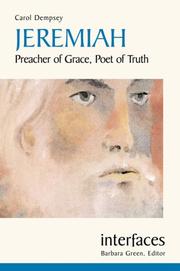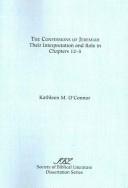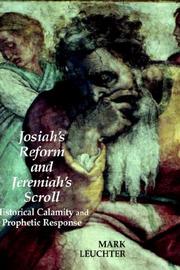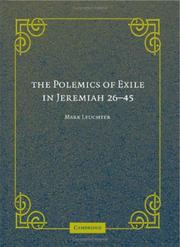| Listing 1 - 10 of 10 |
Sort by
|

ISBN: 9780814659854 0814659853 Year: 2006 Publisher: Collegeville: Liturgical press,
Abstract | Keywords | Export | Availability | Bookmark
 Loading...
Loading...Choose an application
- Reference Manager
- EndNote
- RefWorks (Direct export to RefWorks)
Book
ISBN: 1907534075 9781907534072 Year: 2010 Publisher: Sheffield: Sheffield Phoenix Press,
Abstract | Keywords | Export | Availability | Bookmark
 Loading...
Loading...Choose an application
- Reference Manager
- EndNote
- RefWorks (Direct export to RefWorks)
Book
ISBN: 0802805299 Year: 1992 Publisher: Grand Rapids, Mich. W.B. Eerdmans
Abstract | Keywords | Export | Availability | Bookmark
 Loading...
Loading...Choose an application
- Reference Manager
- EndNote
- RefWorks (Direct export to RefWorks)
Book
ISBN: 0809133342 Year: 1992 Publisher: New York/Mahwah Paulist Press
Abstract | Keywords | Export | Availability | Bookmark
 Loading...
Loading...Choose an application
- Reference Manager
- EndNote
- RefWorks (Direct export to RefWorks)

ISBN: 1555400000 1555400019 9781555400002 9781555400019 Year: 1988 Volume: 94 Publisher: Atlanta Scholars Press
Abstract | Keywords | Export | Availability | Bookmark
 Loading...
Loading...Choose an application
- Reference Manager
- EndNote
- RefWorks (Direct export to RefWorks)
Jeremiah --- Bible. --- Criticism, interpretation, etc. --- 224.3 --- Jeremias. Lamentationes. Klaagliederen --- Jeremiah (Biblical prophet) --- Ieremii︠a︡ --- Jeremia --- Jeremiah, --- Jérémie --- Jeremy --- Yirmeyahu --- ירמיהו --- Jeremiah - (Biblical prophet) --- Eremia
Book
ISBN: 9789042933255 9042933259 Year: 2016 Volume: 82 Publisher: Leuven Paris Bristol Peeters
Abstract | Keywords | Export | Availability | Bookmark
 Loading...
Loading...Choose an application
- Reference Manager
- EndNote
- RefWorks (Direct export to RefWorks)
Based on the examples of Jeremiah 1 and 10, this volume contains contributions of the textual reception and of the exegesis of both chapters. Although textual history and reception history are to be distinguished from each other, they are interconnected, as the textual history of any biblical book is also part of its reception history. Jeremiah 1 and 10 are ideal "test cases" because their textual traditions (MT-Jer and LXX-Jer and its Hebrew Vorlage respectively differ most significantly in terms of rhetoric, structure and content. The volume demonstrates how the Jeremiah's reception history helps to better understand the textual history of both chapters.
Bible. --- Criticism, Textual --- 224.3 --- Jeremias. Lamentationes. Klaagliederen --- Criticism, Textual. --- Bible --- Criticism, interpretation, etc --- Jeremiah (Biblical prophet)

ISSN: 17479614 ISBN: 1905048319 9781905048311 Year: 2006 Volume: 6 Publisher: Sheffield Sheffield Phoenix
Abstract | Keywords | Export | Availability | Bookmark
 Loading...
Loading...Choose an application
- Reference Manager
- EndNote
- RefWorks (Direct export to RefWorks)
Deuteronomistic history (Biblical criticism). --- Jeremiah --- Josiah, --- Bible. --- Criticism, interpretation, etc. --- Deuteronomistic history (Biblical criticism) --- 224.3 --- Deuteronomic history (Biblical criticism) --- Deuteronomists (Biblical criticism) --- DH (Biblical criticism) --- D document (Biblical criticism) --- Jeremias. Lamentationes. Klaagliederen --- Jeremiah (Biblical prophet) --- Josiah, King of Judah --- Bible --- -Criticism, Narrative --- Josia, --- Josias, --- Yoshiyahu, --- Gioas, --- יאשיהו, --- Ieremii︠a︡ --- Jeremia --- Jeremiah, --- Jérémie --- Jeremy --- Yirmeyahu --- ירמיהו --- Jeremiabuch --- Jeremiah (Book of the Old Testament) --- Jérémie (Book of the Old Testament) --- Livre de Jérémie --- Yirmeyah (Book of the Old Testament) --- Yirmeyahu (Book of the Old Testament) --- Jeremiah - (Biblical prophet). --- Josiah, - King of Judah. --- Eremia

ISBN: 9780521879910 0521879914 9780511551147 9780521182768 9780511508110 0511508115 0511551142 1107184045 051150411X 0511508778 0511506252 052118276X Year: 2008 Publisher: Cambridge, UK New York Cambridge University Press
Abstract | Keywords | Export | Availability | Bookmark
 Loading...
Loading...Choose an application
- Reference Manager
- EndNote
- RefWorks (Direct export to RefWorks)
Scholars typically view Jeremiah 26-45 as a collection of episodes constructed during the Babylonian exile that attempts to prove the authenticity of Jeremiah's prophetic status. But Jeremiah's prophetic legitimacy was already widely accepted during the period of the Babylonian exile. These chapters serve a different purpose, namely, to provide a response by the Deuteronomistic scribes to the rise of the Ezekiel tradition and the Zadokite priesthood that threatened their influence among the exilic population. By subsuming their work within an existing and earlier collection of Jeremianic literature, the ideology and political agenda of the Deuteronomists was fused with the literary legacy of a widely respected prophet, giving rise to a larger literary collection that left a profound and lasting impression on Israel's intellectual and social history.
Deuteronomistic history (Biblical criticism) --- Jeremiah --- Bible. --- Criticism, interpretation, etc. --- 224.3 --- Deuteronomic history (Biblical criticism) --- Deuteronomists (Biblical criticism) --- DH (Biblical criticism) --- D document (Biblical criticism) --- Jeremias. Lamentationes. Klaagliederen --- Ieremii︠a︡ --- Jeremia --- Jeremiah, --- Jérémie --- Jeremy --- Yirmeyahu --- ירמיהו --- Arts and Humanities --- Religion --- Jeremiah - (Biblical prophet) --- Eremia
Book
ISBN: 9789042933682 9042933682 Year: 2017 Volume: 83 Publisher: Leuven Paris Bristol, CT Peeters
Abstract | Keywords | Export | Availability | Bookmark
 Loading...
Loading...Choose an application
- Reference Manager
- EndNote
- RefWorks (Direct export to RefWorks)
This volume represents a comparative analysis of the Greek and Hebrew text forms of Jer 10:1-18. One finds that the Hebrew text's ancient battle hymn has been transformed by the old Greek translator into an apotropaic incantation against evil spirits. Thus, the two text forms of chapter 10 hinge upon the Aramaic of verse 11 and whether one finds exorcistic magic in its obscure words or enigmatic condemnation of idolatry from the prophet Jeremiah. The Masoretic text proves to evidence a more ancient textual tone and structure.
224.3 --- 224.3 Jeremias. Lamentationes. Klaagliederen --- 224.3 Jeremie. Lamentations de Jeremie --- Jeremias. Lamentationes. Klaagliederen --- Jeremie. Lamentations de Jeremie --- Bible. --- Jeremiabuch --- Jeremiah (Book of the Old Testament) --- Jérémie (Book of the Old Testament) --- Livre de Jérémie --- Yirmeyah (Book of the Old Testament) --- Yirmeyahu (Book of the Old Testament) --- Criticism, Textual. --- Bible. Old Testament --- Criticism [Textual ] --- Jeremiah (Biblical prophet) --- Criticism, interpretation, etc
Book
ISSN: 21981183 ISBN: 9783525540732 3525540736 Year: 2020 Volume: 272 Publisher: Göttingen Vandenhoeck & Ruprecht
Abstract | Keywords | Export | Availability | Bookmark
 Loading...
Loading...Choose an application
- Reference Manager
- EndNote
- RefWorks (Direct export to RefWorks)
There is a longstanding scholarly debate on the nature of prophecy in ancient Israel. Until now, no study has based itself on the semantics of the Hebrew lexeme nābîʾ (“prophet”). This investigation by William L. Kelly discusses the nature and function of prophecy in the corpus of the Hebrew book of Jeremiah. It analyses all occurrences of nābîʾ in Jeremiah and performs a close reading of three primary texts, Jeremiah 1.4–19, 23.9–40 and 27.1–28.17. The result is a detailed explanation of how prophecy works, and what it meant to call someone a nābîʾ in ancient Israel. Combining the results of the semantic analysis and close readings, the study reaches conclusions for six main areas of study: (1) the function and nature of prophecy; (2) dreams and visions; (3) being sent; (4) prophets, priests and cult; (5) salvation and doom; and (6) legitimacy and authority. These conclusions explain the conceptual categories related to nābîʾ in the corpus. I then situate these findings in two current debates, one on the definition of nābîʾ and one on cultic prophecy. This study contributes to critical scholarship on prophecy in the ancient world, on the book of Jeremiah, and on prophets in ancient Israel. It is the first major study to analyse nābîʾ based on its semantic associations. It adds to a growing consensus which understands prophecy as a form of divination. Contrary to some trends in Jeremiah scholarship, this work demonstrates the importance of a close reading of the Masoretic (Hebrew) text. This study uses a method of a general nature which can be applied to other texts. Thus there are significant implications for further research on prophecy and prophetic literature.
Prophecy --- Nābîʼ (The Hebrew word) --- 224.3 --- 224.3 Jeremias. Lamentationes. Klaagliederen --- 224.3 Jeremie. Lamentations de Jeremie --- Jeremias. Lamentationes. Klaagliederen --- Jeremie. Lamentations de Jeremie --- Hebrew language --- Forecasting --- Etymology --- Jeremiah --- Ieremii︠a︡ --- Jeremia --- Jeremiah, --- Jérémie --- Jeremy --- Yirmeyahu --- ירמיהו --- Bible. --- Jeremiabuch --- Jeremiah (Book of the Old Testament) --- Jérémie (Book of the Old Testament) --- Livre de Jérémie --- Yirmeyah (Book of the Old Testament) --- Yirmeyahu (Book of the Old Testament) --- Criticism, interpretation, etc. --- Jeremiah - (Biblical prophet) --- Eremia
| Listing 1 - 10 of 10 |
Sort by
|

 Search
Search Feedback
Feedback About UniCat
About UniCat  Help
Help News
News